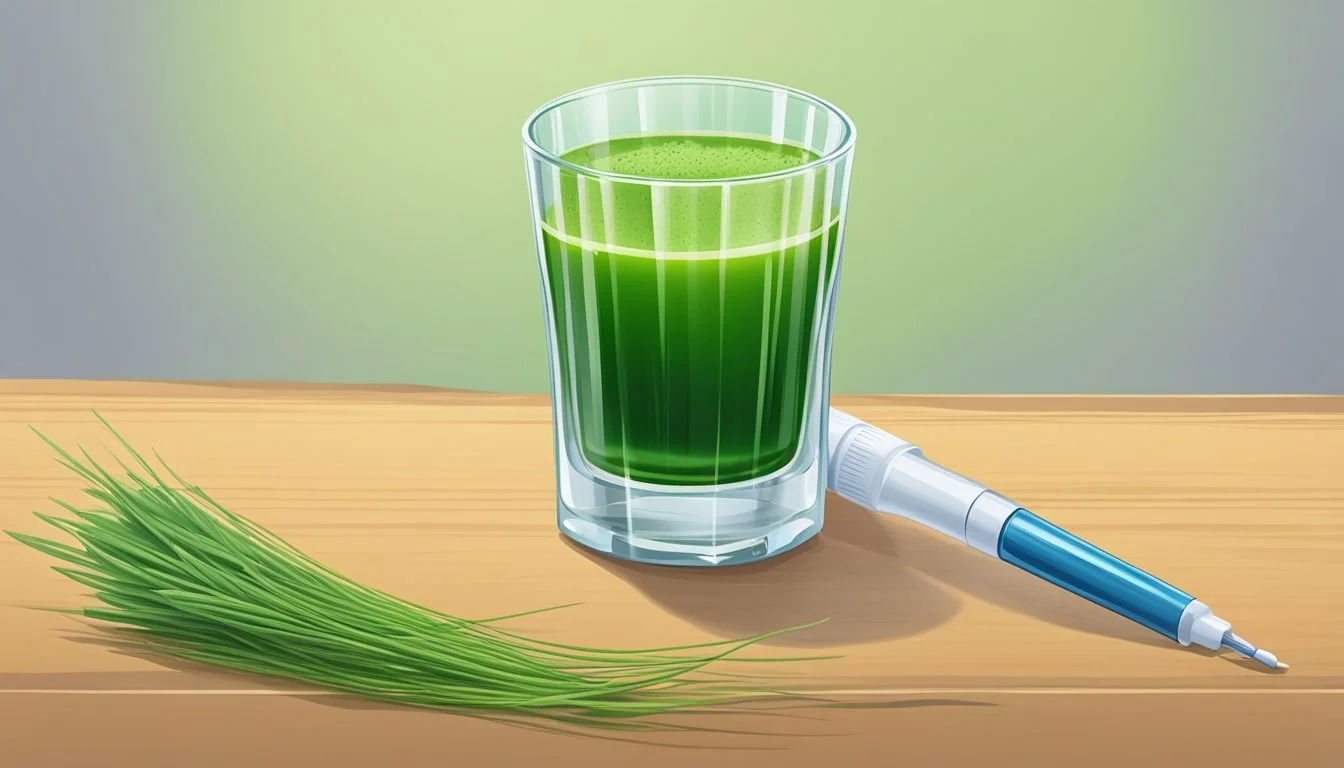Can Pregnant Women Drink Wheatgrass Juice?
Unveiling the Truth for Expectant Mothers
Pregnant women often seek natural supplements and health boosts, such as wheatgrass, to support their well-being and the healthy development of their unborn child. Wheatgrass is a nutrient-rich young grass in the wheat family, and its juice is touted for its high concentrations of vitamins, minerals, enzymes, and antioxidants. The purported health benefits of wheatgrass range from improved digestion to better blood sugar regulation, which could be particularly appealing to expectant mothers managing the various physical challenges that accompany pregnancy.
However, the safety of consuming wheatgrass juice during pregnancy is a topic of debate. Unpasteurized juice or raw wheatgrass can harbor harmful bacteria which pose risks both to the mother and the developing fetus. While wheatgrass in itself contains beneficial nutrients, it must be prepared and consumed correctly to avoid potential health issues. The consensus among health professionals is that while wheatgrass juice may have its benefits, it must be approached with caution when it comes to pregnant women, and it is essential to consult with a healthcare provider before incorporating it into a prenatal dietary routine.
Nutritional Profile of Wheatgrass
Wheatgrass is highly regarded for its dense nutrient composition, offering a wide range of vitamins, minerals, enzymes, and antioxidants. It is often consumed in juice form and can act as a nutritional supplement.
Vitamins and Minerals in Wheatgrass
Wheatgrass is a significant source of many vitamins and minerals that are essential to human health. Notably, it includes high levels of vitamin A, vitamin C, and vitamin E as well as essential minerals such as iron, magnesium, and potassium. Wheatgrass also contains calcium and sodium, and is particularly rich in vitamin K and folic acid, which are important for blood health and cellular growth.
Vitamin A: Crucial for skin health and vision
Vitamin C: Supports immune system function and aids in tissue repair
Vitamin E: An antioxidant that helps protect cells from damage
Iron: Essential for the formation of hemoglobin in blood
Magnesium: Involved in over 300 biochemical reactions in the body
Potassium: Necessary for normal cell function
Vitamin K: Important for blood clotting and bone metabolism
Folic Acid: Vital for fetal development and DNA synthesis
Protein and Amino Acids Content
Wheatgrass provides a surprising amount of protein, which is composed of various amino acids including the essential ones that the body cannot synthesize. The amino acids found in wheatgrass support muscle development and overall health:
Protein: Contributes to muscle repair and growth
Amino Acids: Building blocks of proteins, vital for various bodily functions
Antioxidants and Enzymes
Wheatgrass contains numerous antioxidants, which can help combat oxidative stress and may reduce the risk of chronic diseases. It is also rich in enzymes that can aid digestion and nutrient absorption. The key components contributing to its antioxidant properties include chlorophyll, believed to have detoxifying properties, and enzymes like superoxide dismutase (SOD), which combats free radicals.
Chlorophyll: Linked to natural detoxification processes
Superoxide Dismutase (SOD): An enzyme that helps break down potentially harmful oxygen molecules in cells
In addition to its rich enzyme content, wheatgrass also provides dietary fiber, which can support digestive health, and chlorophyll, which is a notable component of its nutritional value.
Potential Health Benefits of Wheatgrass
Wheatgrass is known for its nutrient-rich composition that may offer various health benefits. It is particularly noted for its high chlorophyll content, vitamins, and minerals. The following subsections provide insight into specific health advantages that wheatgrass may offer, particularly in the context of immune support, digestive aid, skin and blood health, and anti-inflammatory properties.
Immune System Support
Wheatgrass contains vitamins A, C, and E, all of which are known to play a role in strengthening the immune system. The antioxidants present in wheatgrass may help protect cells from damage by neutralizing free radicals, thereby potentially supporting overall immune function.
Aid in Digestion
The high fiber content in wheatgrass can assist in maintaining digestive health. It is known to promote regular bowel movements and may help in keeping the colon clear. Additionally, wheatgrass has enzymes that aid the body in breaking down food and absorbing nutrients, making it a potential ally for digestion.
Skin Health and Blood Circulation
Wheatgrass may have a role in improving skin health due to its nutritional components. The chlorophyll in wheatgrass is believed to not only enhance blood circulation but also to possess antimicrobial properties that can be beneficial for the skin. Healthy blood flow is essential for delivering nutrients to the skin and for supporting skin rejuvenation and healing.
Anti-Inflammatory Effects
Some studies suggest that wheatgrass has anti-inflammatory properties which could be beneficial in reducing inflammation in the body. Inflammation is linked to a number of health conditions, and the potential anti-inflammatory effects of wheatgrass might contribute to overall well-being and the management of inflammatory issues.
Safety and Risks of Wheatgrass During Pregnancy
Wheatgrass is a superfood loaded with nutrients, but its safety during pregnancy is under scrutiny due to several factors. Pregnant women considering wheatgrass should be aware of potential risks.
Firstly, consumption of raw wheatgrass juice may pose a risk of contamination with harmful bacteria, such as Salmonella or E. coli. These bacteria can lead to serious infections, which are particularly risky during pregnancy.
Secondly, the presence of toxins from mold that grows on wheatgrass is a concern. These toxins could potentially lead to health issues, including miscarriage, if ingested in large quantities by expecting mothers.
Allergies to wheatgrass are not common, but pregnant women might experience reactions such as rashes or headaches. An allergy to wheatgrass or any of its components should warrant discontinuation of its use.
Aspect of Concern Reason for Caution Contamination Raw wheatgrass may contain bacteria leading to infections Toxins Possible presence of mold-related toxins Allergic Reactions May cause rashes, headaches, or other allergic symptoms
It's important for pregnant women to consult with healthcare providers before adding wheatgrass to their diet. While some suggest that wheatgrass can be a nutritious addition, evidence-based research on its safety is not conclusive. Pregnant women are advised to approach this superfood with care to avoid potential risks.
Common Side Effects and Allergies
When considering wheatgrass juice during pregnancy, certain side effects and the possibility of allergies should be closely monitored. Pregnant women might experience digestive issues or allergic reactions due to the consumption of wheatgrass.
Digestive Complications
Wheatgrass consumption has been associated with digestive complications in some individuals. They may encounter:
Nausea: An increase in morning sickness can occur, potentially exacerbating the condition often experienced during the first trimester of pregnancy.
Diarrhea: Persistent consumption may lead to diarrhea, resulting in the loss of vital nutrients that are crucial for both the mother and the fetus.
Constipation: Though wheatgrass is believed to aid digestion, some individuals might experience constipation as a side effect.
It is imperative for pregnant women to monitor these symptoms as they can lead to a more serious depletion of essential nutrients if not addressed promptly.
Allergic Reactions to Wheatgrass
Allergic reactions to wheatgrass, though less common, can occur, especially in those with a pre-existing grass allergy. Symptoms can range from mild to severe and include:
Skin rashes or hives: An external manifestation of an allergy.
Headache: Sudden onset of headaches after wheatgrass consumption could indicate an allergic response.
Respiratory distress: Difficulty in breathing or a sensation of throat tightening could be signs of a serious allergic reaction and require immediate medical attention.
Additionally, individuals with celiac disease may react to wheatgrass, as it is derived from a wheat product, despite general assumptions that it is gluten-free when harvested at a certain stage of growth. A healthcare provider should be consulted prior to its use in individuals with this condition.
Recommendations for Consumption
When considering wheatgrass juice during pregnancy, safety and moderation are paramount. Pregnant women should tailor their intake of wheatgrass to their individual health needs and nutritional profiles, with guidance from medical professionals.
Consulting Healthcare Professionals
Before adding wheatgrass in any form to one’s diet during pregnancy, it is crucial to consult a doctor, dietitian, or a healthcare professional. They can offer personalized advice based on the woman’s health, medication, and nutritional needs. Wheatgrass contains iron, calcium, magnesium, and protein, which can be beneficial, but professional input ensures there are no negative interactions with the woman's specific health condition.
Forms of Wheatgrass Intake
Wheatgrass is available in various forms, such as fresh juice, powder, capsules, and can also be added to smoothies. Fresh juice and smoothies should be consumed immediately after preparation to ensure maximum nutrient value. Wheatgrass powder and capsules are convenient as a dietary supplement but check for purity and quality.
Suggested Serving Sizes and Frequency
Moderation is critical when it comes to serving sizes and frequency of consuming wheatgrass. As a general guideline:
Fresh juice or shots: 1-2 ounces per serving
Powder: 1 teaspoon mixed with liquid
Capsules: follow the manufacturer’s recommendations or a healthcare provider's advice
These should be consumed no more than once a day and integrated into a balanced diet. Pregnant women must avoid overconsumption, keeping in mind that wheatgrass is a supplement, not a food staple.
Additional Considerations
When considering wheatgrass juice during pregnancy, various factors must be taken into account to ensure both mother and fetus remain healthy.
Nutrition: Wheatgrass is high in nutrients, providing vitamins, minerals, and enzymes which can be beneficial to the diet of expectant mothers. Wheatgrass contains cellulose that aids digestion and helps alleviate bloating, a common complaint during pregnancy.
Caution: However, caution is advisable as the concentrated nature of wheatgrass juice can impact blood sugar levels. Expectant mothers, particularly those with gestational diabetes, must monitor their sugar intake closely.
Detoxifying Effects: Wheatgrass is often touted for its detoxifying effects and the ability to combat free radicals due to its antioxidant properties. However, during pregnancy, the detox effect might lead to nutritional imbalances which can influence both the mother's and the fetus's health.
Food Safety: There is also the consideration of foodborne illnesses, as raw wheatgrass can harbor harmful bacteria if not properly grown and handled. Pregnant women should ensure that any wheatgrass juice they consume comes from a reputable source with rigorous safety standards.
Breastfeeding Considerations:
Nutritional Benefits: Wheatgrass may support nutrition during breastfeeding.
Alkaline Nature: Its alkaline properties can provide relief from acidity.
Enzyme Content: Enzymes in wheatgrass may aid with postpartum digestion.
Regarding oxidative stress, wheatgrass's antioxidants may offer some protective effects, yet research on its efficacy and safety during pregnancy and breastfeeding remains limited. Prospective dietary changes or inclusion of new elements like wheatgrass should be discussed with a healthcare provider to avoid adverse effects.







